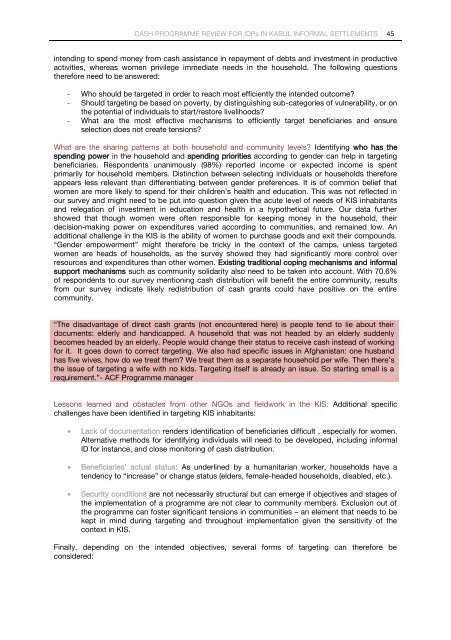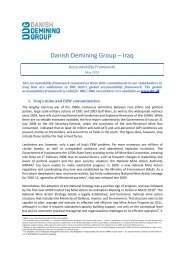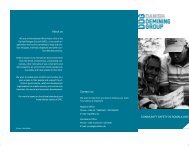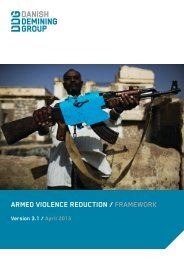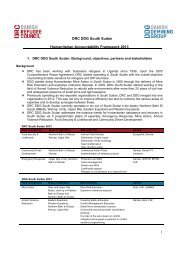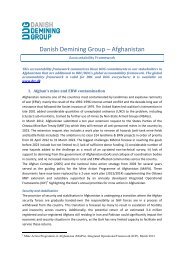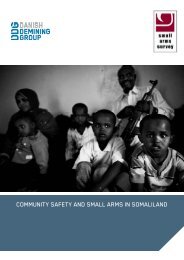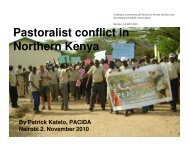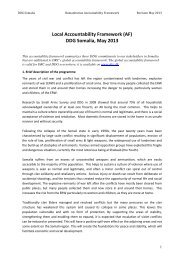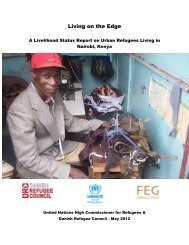Read the full report - Danish Refugee Council
Read the full report - Danish Refugee Council
Read the full report - Danish Refugee Council
Create successful ePaper yourself
Turn your PDF publications into a flip-book with our unique Google optimized e-Paper software.
CASH PROGRAMME REVIEW FOR IDPs IN KABUL INFORMAL SETTLEMENTS 45intending to spend money from cash assistance in repayment of debts and investment in productiveactivities, whereas women privilege immediate needs in <strong>the</strong> household. The following questions<strong>the</strong>refore need to be answered:- Who should be targeted in order to reach most efficiently <strong>the</strong> intended outcome?- Should targeting be based on poverty, by distinguishing sub-categories of vulnerability, or on<strong>the</strong> potential of individuals to start/restore livelihoods?- What are <strong>the</strong> most effective mechanisms to efficiently target beneficiaries and ensureselection does not create tensions?What are <strong>the</strong> sharing patterns at both household and community levels? Identifying who has <strong>the</strong>spending power in <strong>the</strong> household and spending priorities according to gender can help in targetingbeneficiaries. Respondents unanimously (98%) <strong>report</strong>ed income or expected income is spentprimarily for household members. Distinction between selecting individuals or households <strong>the</strong>reforeappears less relevant than differentiating between gender preferences. It is of common belief thatwomen are more likely to spend for <strong>the</strong>ir children’s health and education. This was not reflected inour survey and might need to be put into question given <strong>the</strong> acute level of needs of KIS inhabitantsand relegation of investment in education and health in a hypo<strong>the</strong>tical future. Our data fur<strong>the</strong>rshowed that though women were often responsible for keeping money in <strong>the</strong> household, <strong>the</strong>irdecision-making power on expenditures varied according to communities, and remained low. Anadditional challenge in <strong>the</strong> KIS is <strong>the</strong> ability of women to purchase goods and exit <strong>the</strong>ir compounds.“Gender empowerment” might <strong>the</strong>refore be tricky in <strong>the</strong> context of <strong>the</strong> camps, unless targetedwomen are heads of households, as <strong>the</strong> survey showed <strong>the</strong>y had significantly more control overresources and expenditures than o<strong>the</strong>r women. Existing traditional coping mechanisms and informalsupport mechanisms such as community solidarity also need to be taken into account. With 70.6%of respondents to our survey mentioning cash distribution will benefit <strong>the</strong> entire community, resultsfrom our survey indicate likely redistribution of cash grants could have positive on <strong>the</strong> entirecommunity.“The disadvantage of direct cash grants (not encountered here) is people tend to lie about <strong>the</strong>irdocuments: elderly and handicapped. A household that was not headed by an elderly suddenlybecomes headed by an elderly. People would change <strong>the</strong>ir status to receive cash instead of workingfor it. It goes down to correct targeting. We also had specific issues in Afghanistan: one husbandhas five wives, how do we treat <strong>the</strong>m? We treat <strong>the</strong>m as a separate household per wife. Then <strong>the</strong>re’s<strong>the</strong> issue of targeting a wife with no kids. Targeting itself is already an issue. So starting small is arequirement.”- ACF Programme managerLessons learned and obstacles from o<strong>the</strong>r NGOs and fieldwork in <strong>the</strong> KIS: Additional specificchallenges have been identified in targeting KIS inhabitants:Lack of documentation renders identification of beneficiaries difficult , especially for women.Alternative methods for identifying individuals will need to be developed, including informalID for instance, and close monitoring of cash distribution.Beneficiaries’ actual status: As underlined by a humanitarian worker, households have atendency to “increase” or change status (elders, female-headed households, disabled, etc.).Security conditions are not necessarily structural but can emerge if objectives and stages of<strong>the</strong> implementation of a programme are not clear to community members. Exclusion out of<strong>the</strong> programme can foster significant tensions in communities – an element that needs to bekept in mind during targeting and throughout implementation given <strong>the</strong> sensitivity of <strong>the</strong>context in KIS.Finally, depending on <strong>the</strong> intended objectives, several forms of targeting can <strong>the</strong>refore beconsidered:


